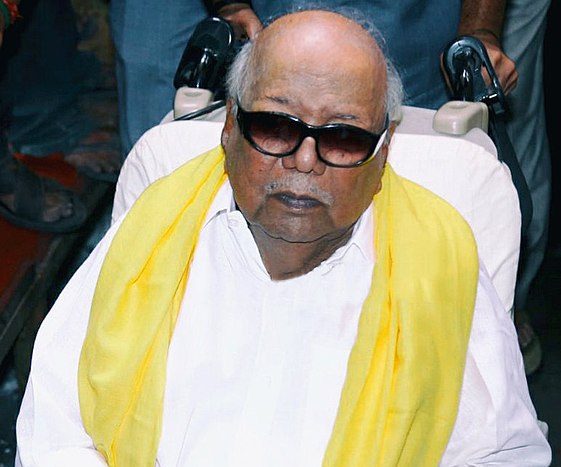Karunanidhi was a political patriarch who reigned an illustrious era and shaped the Dravidian movement. He left behind a big void.
Visionary and sagacious he may have been but perhaps DMK patriarch M Karunanidhi, with his characteristic art of understatement, hadn’t quite envisioned the vacuum he would leave behind. “If one Karunanidhi goes, a hundred Karunanidhis would be born,” he had said. The assumption that his words would be enough to encode his DNA was utopian to say the least. For none have that calling and the commitment to chase it. He was the last man standing of an illustrious peerage of leaders who shaped the Dravidian movement, perhaps not as bright with magnetism as mentor Annadurai, his friend-turned foe MG Ramachandran, his nemesis J Jayalalitha, but solidly weaving a more realistic organisational matrix of cadres. In channelising a movement that single-handedly took on casteism, centrism and propagated federalism and the pride of origin, he created a template for a Tamil Nadu that still holds its own, a self-respecting entity that has managed to tame the swamp of aggressive north Indian politics. In that respect, he will always be the strongman of a system that, now devoid of its personality cult, is yet to fall to Machiavellian moves of the nationalist parties. That legacy deservedly goes to the Kalaignar. Few know that he led a language agitation that galloped into a movement against the imposition of a monoistic idea of India through the use of heartland Hindi. In that sense, he birthed the cultural idea of regionalism as an essential expression of India’s plurality and secularism. Often pioneers are forgotten because the models they initiate become the mainstay of a governance system that is followed by everybody. As chief minister, Karunanidhi codified social welfare policies that have impacted even Central schemes like reservation quotas for the backward, creating a public transport infrastructure and taking the primary school network to every village. He created the first student division of the Dravidian movement, encouraging students to be stakeholders in realpolitik and prioritising technology in the knowledge economy much before any leader. DMK was the only ruling party that opposed the Emergency and was dismissed. This standalone spirit explains the tidal wave of ordinary people who waited teary-eyed at his funeral. For he exemplified jan dharma and stood as its primary gatekeeper, sustaining his connect through generations of supporters and the oppressed by writing columns, elucidating his bold stand on issues. Even as a script writer, he turned his films into vehicles of a grand vision.
But Kalaignar will always be remembered for his masterstrokes as a politician, stitching up alliances and breaking them, seemingly opportunistic. For though he rallied for autonomy of States and prevented the Centre from encroaching on federal territory, that did not stop him from aligning with his tormentor Congress or the ideologically dissimilar BJP at the national level. He realised that with power-sharing, he could not only negotiate better resource flow to the state but also keep his chips relevant in the coalition games. Of course, that edge was quickly lost as corruption allegations clouded his family, something he was accused of prioritising in his last years. But they rarely touched his aura. Neither did son Stalin have an easy favoured spot, he had to earn his stripes. That speaks a lot about a man who is more a concept than a physical entity, dominant enough to get a hyperbole of eulogies.
Courtesy: The Pioneer








 OpinionExpress.In
OpinionExpress.In















Comments (0)